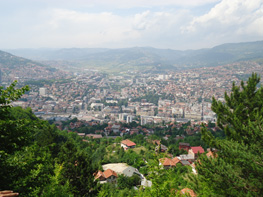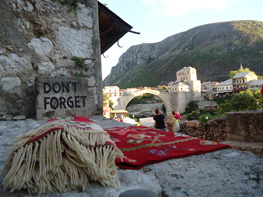‘I don’t care where I live anymore,’ said the Serbian-born middle-aged hostel owner in Montenegro.
‘All I want is peace.’
It is this sentiment that was echoed in the words of many of the locals I spoke to during a recent trip through the Western Balkans.
The region is no stranger to wars – be it civil, military or invasions.
In Sarejevo, the capital of Bosnia and Herzegovina, the pains of the most recent war, which took place between 1992 and 1995, still lingers.
The territorial conflict killed many people, with some putting the total number of casualties at more than 300,000.

A Bosniak friend was kind enough to take us up the mountains that surround this beautiful city.
The view of Sarajevo is breathtaking.
It was here that Serbian forces attacked the civil population. Sarajevo was virtually a sitting duck. Whole towns and villages were destroyed, and atrocities on unimaginable scales took place.
It was eerie walking through the front lines where just under two decades ago, army personnel stood, firing devastation on the city.
‘I’m sorry the world let this happen to your people,’ says my friend, who I traveled with, to the young Bosniak.
‘The world always lets these things happen,’ he replies.
We all go quiet. There’s little to be said when the truth is articulated so well.
It has been more than 15 years since the Bosnian War ended. And yet the ramifications continue.
While Bosniaks, Serbs and Croats inhabit the same territory in Bosnia and Herzegovina, strong ethnic divisions remain.
Will the country ever split, we ask.
‘I don’t think so,’ says my Bosniak friend. ‘People are tired. We just want to live in peace.’
But if it does split, or war breaks out again, will he ever leave Bosnia? He smirks.
‘No,’ he says. ‘This is home.’
And yet for others, like the Serbian-born hostel owner in Montenegro, staying wasn’t a viable option.
‘As soon as the war started I packed up all my bags and left,’ she says.
‘And now, I don’t care about nationality. I don’t care where I live. I’ll come to Australia if I could. Family, friends, they mean nothing after a while. I just want to live in peace.’
‘If I ever hear or feel that a war is coming again, I’ll do the same. I’ll pick up my bags and leave.’
Peace. It’s the only thing she asks for in life.
In Mostar, the largest city in the Herzegovina region, the historical 16th century Ottoman bridge which overlooked the picturesque city was destroyed in the war in 1993. The city’s landmark was no more; and its people felt much the same way.
It was rebuilt to match the original in 2004 through a United Nations-sponsored effort. It reunited the ethnically divided city.

But the memory of the destruction remains. Various signs around the bridge read: ‘Don’t forget’. It’s a daily reminder of the emotional healing which still continues.
The story of a war and what comes from it is not one that is unique to the Western Balkans.
It’s the same story in Kuwait, Iraq, Slovenia, Rwanda, Nepal, Uganda, Pakistan … the list is endless.
But these experiences are so far removed from those we live as Australians, that sometimes it’s difficult to comprehend their true extent.
‘Nobody wins a war,’ says a Bosnian Croat I met. ‘All that’s left are ruins.’
The feeling of helplessness and sympathy overcame me on numerous occasions throughout my trip.
And, like much of the world during conflict, all I could do was sit and watch.
Erdem Koç is a lecturer in journalism at La Trobe University. You can follow him on Twitter: @erdemkoc






